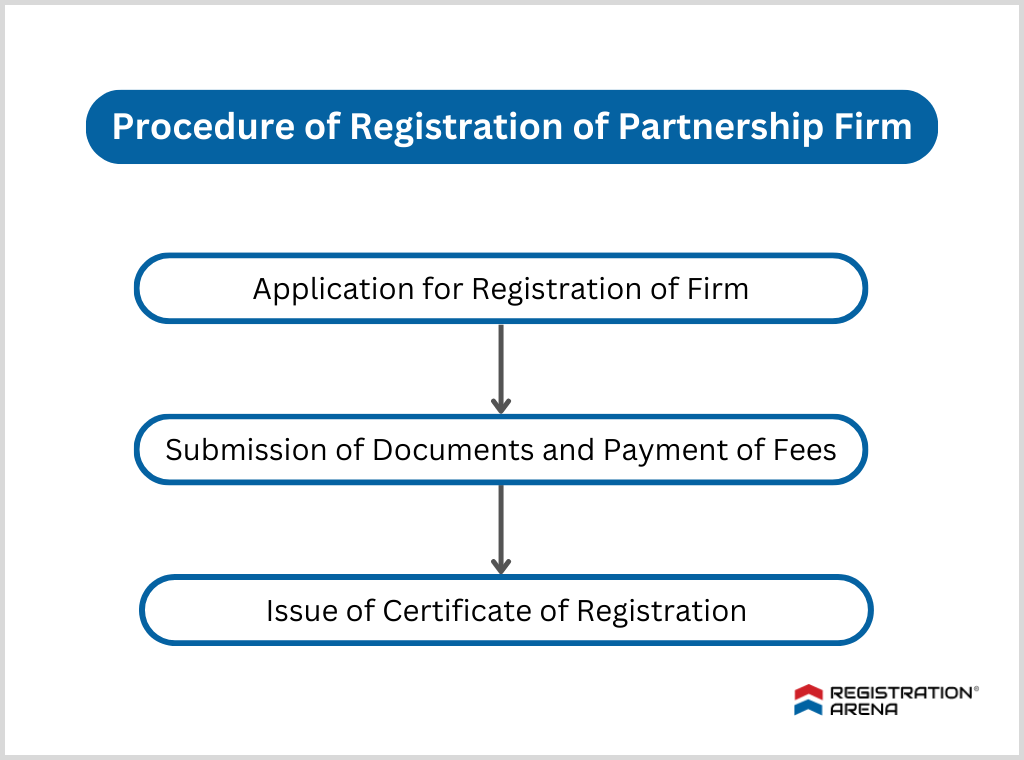A partnership firm is a type of business organization in which two or more persons enter into a contract for carrying on a business together to earn profit. Therefore, at least 2 persons are required to form a partnership firm. In addition, such persons share the profit and losses of the business either in an agreed ratio or equally. The Partnership Act, of 1932 governs partnership firms in India and provides for the registration of such firms as well. In this blog, we will understand the procedure of registration of partnership firms and the documents required for the same.
But before having a look at the procedure of registration of a partnership firm, first, let us understand the meaning of a partnership firm.
What is a Partnership Firm?
A partnership firm is a type of business arrangement where two or more persons come together to carry on a business. They enter into a formal agreement and become the co-owners of the business. In addition, such persons share the profits, losses, risks, and responsibilities of the business and are known as partners of the firm.
Further, partners contribute capital to the business and are liable for the acts of each other. Therefore, there is a contract of mutual agency in a partnership firm.
Moreover, the rights and duties of partners of a partnership firm are governed by a written agreement between them known as a ‘Partnership Deed’.
What are the Different Types of Partnership Firms?

Partnership firms are classified into the following types based on duration, liability, and registration status –
However, registered partnerships and unregistered partnerships are the most common types of partnership firms in India.
Registered Partnership
A registered partnership is a partnership firm that is registered with the Registrar of Firms and that has a certificate of registration. Every state has its own Registrar of Firms and accordingly, the partners should register the partnership firm with the Registrar of the area in which any place of business of the firm is situated or proposed to be situated.
Unregistered Partnership
All partnership firms other than a registered partnership that do not have a registration certificate are known as unregistered partnerships.
Read in detail: 8 Types of Partnership Firm
Minimum Requirements for Partnership Firm
The following are the minimum requirements for forming a partnership firm –
Partners
There must be a minimum of 2 partners to form a partnership firm.
Lawful Business
A partnership firm shall be formed only to carry on lawful business.
Name
The name of a partnership firm should be carefully selected. It should suggest the business activity carried on or to be carried on by the firm. In addition, the name should not be identical to the name of an existing firm. Further, it should not contain words that are prohibited by any law or that the Registrar may consider undesirable, or that require the sanction of the government.
Agreement
The partners shall enter into an agreement that contains their rights and duties. It can be either oral or in writing. When the agreement is in writing, it is known as Partnership Deed. It contains the rights, duties, and obligations of partners along with the profit-sharing ratio.
Profit Sharing
Partners must agree to share the profits and losses of the business.
Mutual Agency
There must be a contract of mutual agency which means each partner shall be liable for the acts of other partners.
Documents Required for Registration of Partnership Firm
The following documents are required for the registration of a partnership firm:
- Copy of Partnership Deed, signed by all the partners, duly stamped and notarized
- Identity proof and Address proof of Partners (Copy of PAN Card/ Aadhar Card/ Voter ID/ Passport/ Driving License, etc.)
- Address Proof of Place of Business (Copy of Sale Deed/ Rent Agreement/ Utility Bills like Electricity Bill, Mobile Bill, etc.). In the case of rented property, the NOC of the owner is also required
- An Affidavit certifying that all the documents and information furnished in the Partnership Deed are correct
- PAN Card of Partnership Firm
- Photographs and Contact Details of Partners
What is the Procedure for Registration of a Partnership Firm?
Now that we have understood all the requirements relating to the registration of a partnership firm, let us look at the procedure for registration.
Following is the partnership firm registration process.

Application for Registration of Firm
An application in Form 1 shall be filed with the Registrar of Firms of the state in which the partnership firm is located. The application shall contain the following details:
- Name of the Firm
- Nature of Business of the Firm
- Principal Place of Business of the Firm
- Other Places of Business of the Firm
- Date of Joining of Partners
- Full Name and Address of the Partners
- Duration for which the Firm is formed
Submission of Documents and Payment of Fees
Along with the application, a certified copy of the partnership deed, all the documents that are mentioned above, and the requisite fees shall be submitted.
Issue of Certificate of Registration
If the Registrar of Firms is satisfied with the application and the supporting documents, he will issue a Certificate of Registration. Also, he will add the firm’s name to the register of firms.
The Certificate of Registration becomes conclusive proof of the existence of the partnership firm.
Therefore, this is the procedure for the registration of partnership firms.
Connect with our experts now to register your partnership firm.
Timeline for Registration of a Partnership Firm
The Partnership Act, of 1932 does not provide any particular timeline for the registration of partnership firms. Therefore, a partnership firm can be registered either at the time of its formation or at any time during its continuance.
Further, the process of firm registration generally takes 10-15 days. However, it is subject to the processing time taken by the government department of the respective state.
Effects of Non-Registration of Partnership Firm
We know that registration of a partnership firm is not compulsory. But if a partnership firm is not registered it suffers from certain limitations. The following are the effects of the non-registration of partnership firms:
No suit against third parties
An unregistered partnership firm or anyone on behalf of such partnership firm, cannot file a suit against a third party for breach of contract. Only a registered firm or its partner can file a suit against a third party.
However, third parties always have a right to file a suit against the firm whether it is registered or not.
No suit against the firm or other partners
A partner of an unregistered firm or anyone on his behalf, cannot file a suit against the firm or other partners of the firm to enforce a right.
However, such a person has the right to sue the firm for dissolution or for obtaining its accounts, or for realizing the property of the dissolved firm.
No power to claim set-off
An unregistered firm or any of its partners cannot claim a set-off of more than Rs. 100 in any proceedings that are initiated against the firm.
Also read: Advantages and Disadvantages of Partnership Firm
Conclusion
Considering the effects of non-registration of a partnership firm, it is always beneficial to register the partnership firm. Also, the procedure of registration of partnership might seem easy but it is always advisable to take the help of experts. Moreover, the partnership deed shall be carefully drafted including all the important clauses to avoid future disputes.
Registration Arena is having a team of experts to help you with the registration of your partnership firm. Our team will make the process easier for you. We can also assist you in the registration of your trademark and filing of income tax, and GST returns.
Call us now at +918600544422 or drop an email at support@registrationarena.com for more information.








